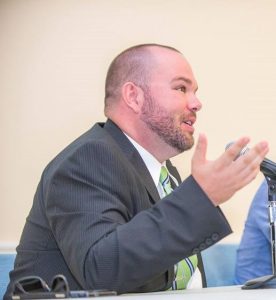 As part of the 2017 College Series, I have invited a few individuals to write guest blogs. Today’s blog comes from Christopher Campau, the Collegiate Recovery Program Coordinator for the state of North Carolina. If you have a student who has struggled with substance use in high school and you are wary of sending them off to a college campus environment, please read on!
As part of the 2017 College Series, I have invited a few individuals to write guest blogs. Today’s blog comes from Christopher Campau, the Collegiate Recovery Program Coordinator for the state of North Carolina. If you have a student who has struggled with substance use in high school and you are wary of sending them off to a college campus environment, please read on!
What is the scope of Collegiate Recovery in NC?
A collegiate Recovery Program/Community is a supportive environment housed in an academic institution to support and serve students who are in recovery from a Substance Use Disorder (SUD), apart from the culture of drinking that exists on a college campus. A Collegiate Recovery Program (CRP) usually is a recognized entity by the institution, receives funding, and has at least one dedicated staff member. A Collegiate Recovery Community (CRC) is less organized, has very little sustainable funding, and will not have a dedicated staff member; these communities will often exist as a student organization or will be led by someone whom has an entirely separate role on campus. Students within a collegiate recovery program tend to do very well; having higher GPA’s, graduation, and retention rates than the general student body.
North Carolina has had tremendous growth in the burgeoning collegiate recovery world. In 2013, Governor McCrory signed an executive order creating a substance abuse task force, and gave funding ($125,000 over 3 years) to 6 universities; UNCC, UNCG, NC A&T, UNC, ECU, and UNCW. Even before this event, many schools, administrators, and students had been working hard to ensure better recovery supports for students. While these six schools received direct funding, other schools have also began efforts including: North Carolina State University, Western Carolina University, UNC-Asheville, Duke University, and Wake Forest University. Also, North Carolina has begun to lead the way in these efforts in the community college system. Central Piedmont Community College, Wake Technical CC, Nash CC, Southwestern CC, and Guilford Tech have recently joined the conversation.
Why are College Recovery Programs & Communities important for college students in general?
While these programs are extremely important to the students in recovery, these efforts are vital for incoming students who face many new stressors, a new sense of freedom, identity development, and a longing for acceptance from their peers. For years we have known the difficulties of attending a University in another town, or even another state, and the longing for comfort and friendship students face as they begin to have their first experiences as an “adult”. Ten percent (10%) of college students will develop a SUD in their lifetime (on par with the national average); however, 20.6% of all current college students currently meet the criteria for a diagnosable SUD--much higher than the national average. While half of these students will phase out and not have a lifelong issue, it doesn’t make their current use any less dangerous or problematic to their academic achievements. A university that has a collegiate recovery program can offer supportive, non-drinking peers for young people to engage with and help students acquire beneficial coping skills as well as strategies and events that encourage healthier behavior. Furthermore, a university/college that supports collegiate recovery shows a dedication to changing the culture of substance misuse on campus.
Every public (and most private) institutions will engage in some form of alcohol and other drug prevention. They are just a small part of a team that is responsible for the overall safety of young people stepping onto a college campus. Many young people will be required to engage in alcohol and drug education, and will receive numerous e-mails about safe and healthy events. These programs will help to engage the student, but their peers still hold the majority of influence over their behavior. Alcohol use and binge drinking have been on the decline among high school students, but many young people still believe that “everyone is doing it”. This perception is dangerous, as a young person’s longing to fit in trumps messages they are receiving from well-intentioned parents, educators, and other adult leaders. Films about going to college still glorify drinking and unsafe behavior on a campus, and this will influence a young person as well. Meeting non-drinking students early on in a college career will help to combat the “everyone is doing it” argument, and show that campus life is more about being involved in the campus culture than alcohol and drug use.
How can parents help support their student?
If there is a history of substance use in the family, please take the time to speak with your children. This might be the most meaningful message they receive, even if they are not fully aware of its depth and weight. It is important have clear expectations for your student in terms of grades, drinking, and other aspects of college. Finally, be available. If and when a student needs help, they might not know who to turn to on campus until they are in trouble. The importance of having an open dialogue means they might come to you first to help them navigate any situation they are facing.
Please visit http://www.apnc.org/collegiate-recovery-program/ for a list of schools in NC with a Collegiate Recovery Program. Outside NC, check out http://collegiaterecovery.org/programs/. Also, please familiarize yourself with all resources a University offers: Counseling Center, Women’s Center, Health Promotion, Wellness Center, etc.
